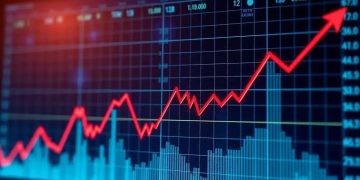Economic policy uncertainty: what you need to know

Anúncios
Economic policy uncertainty refers to the unpredictability surrounding government policies that significantly impact businesses and investment decisions, necessitating proactive risk mitigation strategies.
Economic policy uncertainty is a critical factor influencing both individual and corporate decisions. Have you ever wondered how shifting policies can alter your financial landscape? Let’s dive into this complex topic.
Anúncios
Understanding economic policy uncertainty
Understanding economic policy uncertainty is crucial for both individuals and businesses. This uncertainty can arise from various factors and has significant implications for the economy. By grasping the concept and its effects, you can make better decisions in your financial planning.
What Causes Economic Policy Uncertainty?
Several elements contribute to economic policy uncertainty. These may include:
Anúncios
- Government changes and elections
- New legislation affecting the economy
- International relations and trade agreements
- Market reactions to policy announcements
Each of these factors can create a ripple effect throughout the economy, impacting investment and consumer behavior.
The Impact on Businesses
Businesses often face challenges during periods of uncertainty. When there is uncertainty in economic policies, companies may delay investments, leading to lower growth. Understanding this can improve strategic planning.
For instance, a business may consider:
- Assessing market conditions
- Developing flexible strategies
- Evaluating long-term projects with caution
By closely monitoring economic signals, businesses can adapt to shifting policies more effectively.
On a broader scale, economic policy uncertainty can lead to volatility in stock markets and reduced consumer confidence. This is why investors pay close attention to economic indicators.
Further, clear and consistent policies can provide stability, encouraging investment. Thus, governments play a key role in managing this uncertainty through transparent communication.
Lastly, economic forecasts and expert analyses can help navigate through uncertainty. They offer insights on potential outcomes and assist in making informed choices.
Factors contributing to economic policy uncertainty

Several factors contribute to economic policy uncertainty, influencing how businesses and individuals react to the market. Understanding these factors is essential for navigating economic landscapes effectively.
Political Events
Political events, such as elections and legislative changes, can create significant uncertainty. For instance, shifts in leadership often lead to new policies that affect the economy. This unpredictability can impact investment decisions.
In many cases, politicians introduce reforms that may alter tax structures or regulatory frameworks. This leads to:
- Changes in consumer confidence
- Variability in spending patterns
- Reactions from international markets
During election cycles, the anticipation of policy shifts can create an environment of cautiousness among investors and consumers.
Global Economic Conditions
Global events also play a crucial role in shaping economic policy uncertainty. For example, international trade agreements or conflicts can influence domestic policies. When foreign relations are shaky, it often leads to:
- Increased tariffs
- Regulatory changes
- Import/export restrictions
This can create an unpredictable market environment, affecting businesses that rely on international trade.
Additionally, economic downturns in other countries can cause ripple effects. These global shifts can strain resources and prompt governments to adjust policies swiftly to stabilize their economies.
Another contributing element is economic indicators. Metrics such as unemployment rates, GDP growth, and inflation can signal potential policy changes. Policymakers often respond to these indicators to maintain economic stability.
Public sentiment also impacts uncertainty. If consumers feel insecure about the economy, they may hold back on spending. This can further complicate policymakers’ decisions, as they need to address growing concerns while trying to foster economic growth.
The role of government decisions
The decisions made by governments play a vital role in shaping economic policy uncertainty. These choices can directly influence markets, investments, and overall economic stability.
Policy Formulation
When governments create policies, they set the stage for how businesses operate. These policies may include tax laws, regulations, and trade agreements. Each decision impacts how companies plan and invest. For example, favorable tax policies can encourage businesses to invest more in growth.
However, if policies are frequently changing or unclear, it can create hesitation among investors. This leads to:
- Delays in business expansion
- Reduced consumer spending
- Increased caution among lenders
Understanding this helps to grasp why stable and clear policies are essential for fostering a healthy economy.
Regulatory Changes
Another significant factor is the impact of regulatory changes. When regulations are tightened or loosened, businesses must adapt quickly. Sudden shifts can lead to uncertainty, affecting their planning and operations.
For example, new environmental regulations can require companies to change their processes, which may involve significant investment. This can result in:
- Higher operational costs
- Changes in product offerings
- Potential layoffs or restructuring
Each of these outcomes can create a ripple effect throughout the economy. Businesses may hesitate to hire new employees or make long-term investments, fearing future regulatory changes.
Furthermore, government decisions on spending priorities greatly influence economic conditions. Depending on where resources are allocated, sectors like education, healthcare, or infrastructure may experience growth or decline. This creates a complex web of dependencies that businesses need to navigate.
As such, understanding government roles and decisions can help individuals and companies make smarter financial choices, ensuring they stay ahead in a fluctuating economic environment.
Implications for businesses and investments

The implications of economic policy uncertainty for businesses and investments are significant and multifaceted. These uncertainties can influence decision-making at various levels, affecting growth and development prospects.
Investment Hesitation
One major effect is investment hesitation. When there is uncertainty in economic policies, companies often delay making capital investments. This leads to a slowdown in expansion plans, preventing businesses from reaching their full potential.
The reasons for this hesitation include:
- Fear of changing regulations
- Concerns over potential tax increases
- Unpredictable market conditions
These factors can create a climate of caution among business leaders, resulting in missed opportunities.
Impact on Financial Markets
Economic policy uncertainty also contributes to volatility in financial markets. Investors react to news and potential policy changes, leading to fluctuating stock prices. This volatility can make it challenging for businesses to predict future capital costs.
Additionally, market uncertainty can result in:
- Increased borrowing costs
- Difficulty in attracting investments
- Fluctuations in consumer confidence
As a result, businesses may find it harder to secure necessary funding, which impedes growth efforts.
Moreover, sectors like construction and manufacturing are particularly sensitive to these changes. Sudden policy shifts can lead to project delays or cancellations, directly impacting employment and economic stability.
Businesses must also consider the broader economic environment when formulating their strategies. High levels of uncertainty can lead to cautious consumer spending, which further affects demand for goods and services. Understanding these dynamics is crucial for developing effective business strategies.
Strategies to mitigate risks
Businesses can adopt various strategies to mitigate risks associated with economic policy uncertainty. By being proactive, they can navigate challenges more effectively and protect their investments.
Diversification of Investments
One effective strategy is diversification of investments. By spreading investments across different sectors and geographies, businesses can reduce their exposure to risks linked to specific policies.
This diversification can include:
- Investing in various industries
- Expanding into international markets
- Utilizing different asset classes
By doing this, companies can cushion against downturns in specific areas and enhance overall stability.
Scenario Planning
Another approach is scenario planning. This involves developing multiple potential future scenarios based on different policy outcomes. By preparing for various possibilities, businesses can respond more quickly when changes occur.
Effective scenario planning can lead to:
- Enhanced decision-making capabilities
- Better resource allocation
- Fewer surprises in uncertain times
This proactive mindset enables businesses to stay flexible and ready to adapt as conditions evolve.
Moreover, businesses should focus on strengthening their communication strategies. Keeping employees and investors informed helps build trust and can encourage a united approach to facing uncertainty. Regular updates can ease concerns and reinforce a company’s resilience.
Additionally, building strong relationships with government officials can prove beneficial. Businesses that stay engaged with policymakers can gain insights into potential changes and influence decisions that affect them.
Finally, investing in technology and data analytics can aid in understanding market trends. Using data-driven insights enables companies to make informed decisions about where to allocate resources and how to adjust strategies in response to changing economic conditions.
Future outlook on economic policy uncertainty

The future outlook on economic policy uncertainty shows that it will continue to play a critical role in shaping economic conditions. As political landscapes evolve and global events unfold, businesses need to stay prepared for fluctuations.
Potential Shifts in Policies
Governments will likely focus on adapting their policies to respond to emerging challenges. This can mean new regulations, tax reforms, or trade agreements. Understanding these potential shifts is essential for businesses as they navigate uncertainties.
Some factors that could influence policy changes include:
- Economic crises or downturns
- Public opinion and activism
- Technological advancements
Each of these aspects can prompt governmental action, which in turn affects economic stability.
The Role of Globalization
Globalization will also impact economic policy uncertainty. As economies become more interconnected, changes in one region can ripple across the globe. Economic policies in major economies will influence smaller nations, creating a domino effect.
Monitoring international developments becomes increasingly important. Companies engaging in global markets must remain vigilant to adapt to various regulations worldwide.
Another consideration is how technology will drive change. Technological innovations can disrupt traditional economic structures, prompting policymakers to rethink existing frameworks. This may lead to rapid shifts, keeping businesses in a constant state of adjustment.
Finally, the influence of economic forecasts cannot be ignored. Analysts and economists will play a vital role in predicting trends and guiding businesses through the uncertainties ahead. Access to accurate data and insights will empower companies to make informed decisions, ensuring they remain competitive in a changing landscape.
FAQ – Questions About Economic Policy Uncertainty
What is economic policy uncertainty?
Economic policy uncertainty refers to the unpredictability surrounding government policies that can affect the economy, leading to hesitation in business and investment decisions.
How can businesses mitigate the risks of economic policy uncertainty?
Businesses can mitigate these risks through strategies like diversification of investments, scenario planning, and effective communication with stakeholders.
Why is global awareness important for businesses facing economic uncertainty?
Global awareness helps businesses understand how international events and policies can impact their operations and the overall economy, allowing for better preparedness.
What role does data analytics play in managing economic uncertainties?
Data analytics provides insights into market trends and consumer behavior, enabling businesses to make informed decisions and adapt quickly to changing economic conditions.






